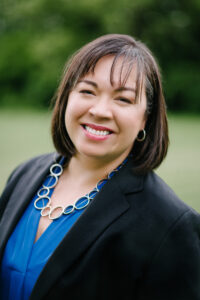 Name: Renee Moe
Name: Renee Moe
Title and Organization: President and CEO of United Way Dane County.
Graduation Year and Degree: 1999 B.A. in Journalism
J-School alum Renee Moe (B.A. ‘99) is the president and CEO of United Way Dane County, an organization that works to mobilize the community in collaboration with local nonprofits, businesses, community leaders, donors and volunteers to solve issues of education, income and health disparities. Moe also serves on the board of the Center for Journalism Ethics. We caught up with her to hear more about her career journey and what she remembers most from her time in the J-School.
When it comes to your career, what are some of the things you are most proud of?
Pride in our capable, passionate staff comes to mind first! We collaborate with so many partners across the community and it takes enormous leadership to listen, navigate through the complex to get to clarity, and be accountable for measurable, meaningful change. We’re a diverse team with a wide range of skill sets, which makes our outcomes stronger.
In United Way of Dane County’s first century, we’ve raised over $580 million dollars and catalyzed an estimated 13 million volunteer hours for community change initiatives and collective impact projects.
We’ve co-created new approaches with partner nonprofits that have ended homelessness for over 800 local families with 2,000 children, graduated over 7,000 students from Dane County school districts with improved literacy and algebra skills to position them for what comes after high school, and are piloting a care coordination system with our healthcare partners to reduce racial disparities in Black birth outcomes.
What advice would you give to a J-Schooler who wants to do what you do?
Stay curious and keep connecting dots! Because so many systems stories are told through individual stories, it’s important to have an understanding of the big “so what’s” and the skill to lift the bigger issues up through more compelling individual stories. Just because it’s harder to tell the big story (poverty, racism, economics), don’t shy away from including the root causes and examples of what can be done. I confess one of the difficult things I found about reporting was that after learning about multiple sides of a story, I had an innate drive to problem solve which wasn’t always appropriate! If you’re curious about social issues and love to not only dig deeper to understand but connect dots to uncover different approaches, systems change nonprofit work might be a great fit. Journalism skills are applicable in every career, in my opinion. Synthesizing information, distilling key points, communicating concisely and empowering others with information to make good decisions about their lives and the systems that impact their lives is valuable across many different sectors and careers.
What is your favorite J-School memory?
The first memory that comes to mind was the day we took the JUT – Journalism Usage Test – in Jim Hoyt’s class. I remember walking out of the big lecture hall thinking it was straightforward and then a half-dozen classmates were talking about how hard and tricky it was. That made me recognize and appreciate my primary through high school teachers in ways I hadn’t appreciated them before!
I was also a member of the student organization of Society of Professional Journalists (SPJ) and we had great local journalists come to speak to us in the Nafziger Conference Room every month. I remain friends with some of them to this day. One of my teaching assistants was Vincent Filak who quizzed us on the content of the State Journal’s front page every class and taught us an acronym for what is newsworthy: CATNIP – conflict, action, timely, novel, impact, proximity. Amazing how vivid those Vilas Hall memories are! I am very grateful to the J-School and happy to give back a little through service with the Center for Journalism Ethics. Katy Culver is an inspiration.